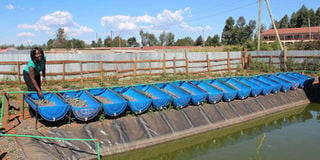Modern way of farming chicken, fish and veges

Robertina Chikamai in her farm in Kimumu, Eldoret County, where she has constructed two fish ponds. She uses pebbles to grow crops which help to regulate the oxygen in her ponds. PHOTO | STANLEY KIMUGE | NATION MEDIA GROUP
What you need to know:
- Acquaponics system helps to check the toxins in water.
- Robertina says she later learnt of the aquaponics system from a farm in Eldoret and fell in love with it.
- The fish waste provides organic food for the plants, and the plants naturally filter the water for the fish.
- Fish droppings or feed remains can accumulate in water leading to formation of toxins (like ammonia). But this system sucks these materials and filters the water.
Dressed in a green blouse and a black dress, Robertina Chikamai picks a yellow tin containing feeds and heads to two fish ponds adjacent to her home in Kimumu, Eldoret.
She then starts to sprinkle into the water the feeds as the fish darts to eat them.
She later walks into a nearby house and switches on an electric machine. Water starts to flow from the fish pond to several blue plastic containers hosting plants that include collard greens (sukuma wiki), night shade (managu), spinach, beetroot and strawberries.
“This is equivalent to what can be grown on an acre. We consume and sell the surplus to the traders,” says Robertina.
The thirty-two-year-old farmer practices what is known as aquaponics farming.
Aquaponics combines aquaculture and crops farming, with the two growing in a symbiotic environment.
“The aquaponics system is connected to electricity which allows the regulation of water. I switch it three times a day for at least 20 minutes,” she says.
Robertina in July last year took a leap of faith with the help of her parents to construct an earth pond measuring 18 by 20 metres and then stock it with the African catfish fingerlings.
“I completed my studies in 2011 and getting a job became a challenge. I was motivated to create one myself through this project.”
But it was not rosy as soon as she ventured into fish farming. Most of her fish stock died, but that did not discourage her.
“I bought and stocked 4,000 fries from the Lake Basin Development Authority spending Sh40,000 but only 17 survived,” says the alumni of Eldoret Aviation College, who studied a Diploma in Sales and Marketing.
What killed her fish, according to her, was bad weather as she stocked the pond with the fries during a cold season.
“The fries were delicate and susceptible to harsh weather as they were about one week.”
Robertina says she later learnt of the aquaponics system from a farm in Eldoret and fell in love with it.
CHECKS TOXINS IN THE WATER
“I found the mode of farming captivating and decided to restock the catfish in September, going for bigger ones from a farm in Thika, after installing the system with financial help from my parents,” she says, adding the entire project has cost Sh1.5 million.
The fish waste provides organic food for the plants, and the plants naturally filter the water for the fish.

The innovative Robertina next to a chicken coop that she erected above one of the ponds, with the birds’ manure fertilising the water and providing food for the fish. PHOTO | STANLEY KIMUGE | NATION MEDIA GROUP
Two months ago, she put up another smaller pond and stocked it with 4,500 tilapia fingerlings. Slightly above the fish pond, she has put a chicken coop, with the birds’ manure fertilising the water and providing food for the fish.
“The droppings help plants like algae to grow in water. After some days, the water turns green an indication of the algae,” says the farmer, adding she keeps up to 10 chickens at a given time.
Her two ponds, one hosting catfish and the other Nile Perch, have 44 growing beds. She has also installed a mushroom aerator which oozes water that helps improve oxygen in fish pond.
And to reduce the costs, the young farmer also formulates her own fish and chicken feeds from wheat or rice bran, fish meal (fish dust) and sunflower cake.
Her challenges include finding market for her produce as not many people are used to cat fish.
Cat fish matures in six to eight months and fetches Sh500 to Sh1,300 in the market each. However, Nile Perch is the most popular with buyers.
Evans Machuka, Uasin Gishu County fisheries officer, says that one of the benefits of aquaponics system is that it helps to check the toxins in the water.
“Fish droppings or feed remains can accumulate in water leading to formation of toxins (like ammonia). But this system sucks these materials and filters the water.”
He adds that plants in the system are able to use the toxins while the filtered water goes back to the pond.
“Those farmers who live in areas like the Coast can use coconut shells as substrate to grow the plants in the carrier beds. One, however, must make sure that the number plants should not be fewer than the fish,” says Machuka.





